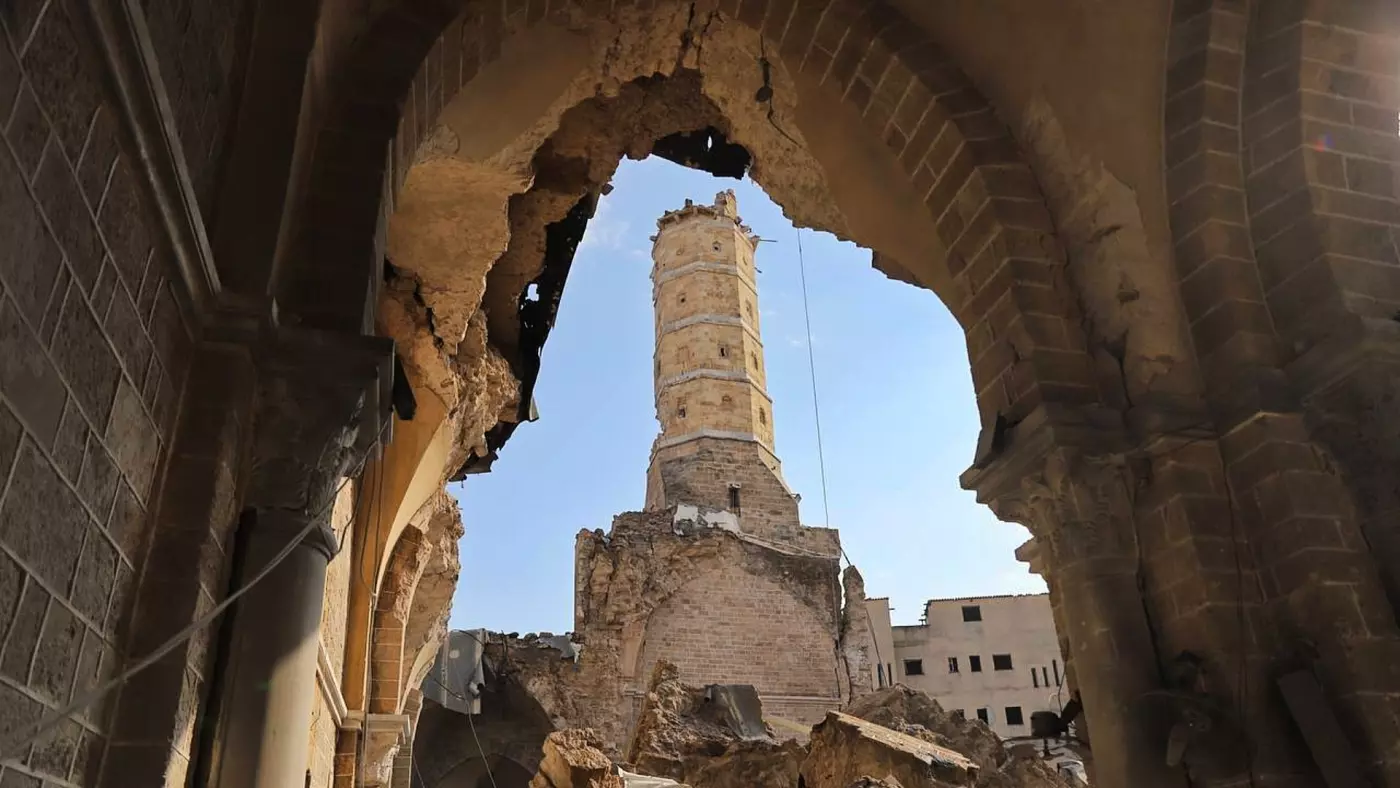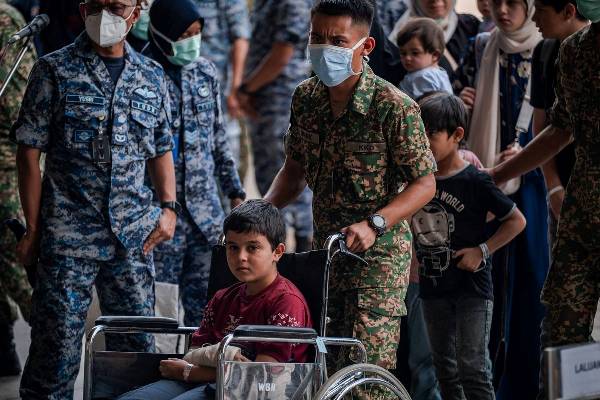Armed conflicts are nasty, ruthless and, often, long and peculiarly intractable.
This is especially true when one side is vastly stronger than the other, allowing brute repression, slavish submission, expulsion or extermination of the weaker party.
Ask the Tutsis of Rwanda, the Bosnian Muslims of Srebrenica, Myanmar’s Rohingya ethnic minority, or these days, the Palestinians of Gaza. That is, to ask the remnant that has survived the unfathomable violence unleashed against them with genocidal incitement and intent.
The government of Israel is seeking to erase the Palestinian people. Over the past seven weeks, Palestinians have suffered the wrath of Israeli exterminating force: a carpet-bombing campaign pitilessly targeting fleeing civilians and civilian infrastructure, including, hospitals, UN-run schools, mosques, churches, bakeries, water tanks and even ambulances, at a scale never seen before.
Huge swathes of neighbourhoods and five-generation families across Gaza have been obliterated. Over 15,000 people have been reportedly killed, including 6,000 children, and countless others buried beneath the rubble of demolished buildings.
Let me repeat that number: 6,000 children have been killed in Gaza in just seven weeks of conflict.
Regardless of its justification for initiating the unrelenting onslaught on Gaza, there is mounting evidence that Israel’s actions in Gaza might well make a compelling argument that articles II and III of the Convention for the Prevention and Punishment of the Crime of Genocide of 1948 (Genocide Convention) have been violated.
And while individual criminal liability of those personally responsible may be pursued elsewhere, including at the International Criminal Court (ICC), high expectations are raised by the prospect of the International Court of Justice (ICJ), or World Court, holding the state of Israel responsible for breach of its treaty obligations arising under the Genocide Convention.
Cease and desist
The question of which recourse offers the most productive outcome in holding to account those responsible for genocide perpetrated against the Palestinians is an important one.
States party to the Genocide Convention have a common interest in seeking legal accountability at state level. Acting solely out of international public interest to uphold a pillar of the post-Second World War rules-based international order, any state party to the Genocide Convention may invoke it by introducing proceedings before the ICJ alleging the commission of genocide by Israel.
Follow Middle East Eye’s live coverage for the latest on the Israel-Palestine war
Subsequently, it could request provisional measures, seeking for Israel to cease and desist from acts of genocide, to prevent the commission of genocide and to preserve evidence of the same.
Under the Genocide Convention, the basic structure of the crime of genocide requires consideration of whether there is a protected group, whether acts in one or more of the specified categories of Article II of the convention have been committed, and whether the acts were committed with genocidal intent.
Genocidal intent can, ‘in the absence of direct explicit evidence, be inferred from’ circumstantial evidence
Genocidal intent can, “in the absence of direct explicit evidence, be inferred from” circumstantial evidence.
For the purposes of the Genocide Convention, the Palestinian people constitute a national group. The Palestinians of Gaza constitute a substantial part of the Palestinian population.
Article II of the convention – as reprinted in Article 6 of the Rome Statute of the ICC – lists five underlying acts of genocide.
According to Raz Segal, a professor of Holocaust and genocide studies, Israel is presently perpetrating three of these acts in Gaza. Those three are: “1) Killing members of the group; 2) Causing serious bodily or mental harm to members of the group; 3) Deliberately inflicting on the group conditions of life calculated to bring about its physical destruction in whole or in part.”
Definitions of genocide
As of 25 November, Israeli military forces have reportedly killed more than 15,000 Palestinians in Gaza, with 30,000 having suffered serious bodily or mental harm and another 7000 missing, believed to be trapped under the rubble.
In popular discourse, genocide is thought of as extermination through organised mass killing. However, the Genocide Convention embodies the idea that a group can be “destroyed” by acts that fall short of mass murder. Deliberately depriving a group of people of resources necessary for survival, such as food or essential medical services, housing, or carrying out systematic expulsions, can amount to war crimes, crimes against humanity and, indeed, genocide.
The conditions would lead to the destruction of the group, not by immediate death, but by subjecting its members to measures that would lead to their slow death.
Israel’s military acts in Gaza have matched those words. It has imposed a suffocating siege on the blockaded enclave, cutting off the Strip’s electricity and water supplies – largely controlled by Israel – and blocking the entry of food, fuel, medical supplies and other essentials, leading to a humanitarian catastrophe of biblical proportion.
Siege warfare – impeding humanitarian access and deliberately starving civilians – is an egregious but proliferating tactic of war. It is a prohibited and prosecutable war crime under international humanitarian law (IHL).
“Surrender or starve” is much more than an accidental byproduct of the conflict. It is part of Israel’s policy – planned, coordinated and implemented at the highest echelons of the Israeli government to inflict mass suffering on the Palestinians of Gaza, leading to their physical destruction.
As world-renowned expert on genocide law, William Schabas, has concluded: “The conduct of the state of Israel provides evidence from which genocidal intent can be inferred.”
Forcible displacement
Aside from the mass killing, colossal destruction of infrastructure and siege warfare, Israel has displaced 1.6 million people – over half of the population of Gaza. The majority of Palestinians in Gaza are refugees expelled from their homes in what is now Israel in the 1948 war, or their descendants.
There is every indication that the official policy of the Israeli government is to rely primarily upon forcible displacement and massive population transfer. And while forcible transfer is not deemed a stand-alone indicia of the intent to destroy, it is a relevant consideration when assessing genocidal intent.
Direct evidence in the form of inflammatory statements from senior Israeli government and military officials, including the prime minister, indicate that the scale, brutality and systematic nature of Israel’s gross violations are being carried out with genocidal intent.
The genocidal language of the Israeli government and its agents are both indicative and constituting of admissions. It makes clear that the state of Israel is seeking, through its acts, to destroy the Palestinians, as a group, in whole or in part.
Accountability and the pursuit of justice must not be limited to the trials of a few accused. The state of Israel can and must be held to account
Numerous genocide scholars, UN officials and human rights organisations have publicly agreed with that assessment.
The Genocide Convention recognises responsibility at both the state and individual levels and calls for accountability for both.
The demand for international criminal accountability for crimes committed against the Palestinians is diverting attention from other potential legal actions, despite a credible case, based on powerful evidence that Israel is attempting to commit, if not actively committing, genocide against the Palestinians.
Accountability and the pursuit of justice must not be limited to the trials of a few accused. The state of Israel can and must be held to account.
Lengthy process
Whatever the merits of pursuing individual criminal accountability, an ICC action is unlikely to provide immediate relief to the Palestinians of Gaza and the rest of the occupied territories. It will not result in exerting pressure on Israel to reverse course either.
An ICC action is much less satisfying than many would imagine. It cannot request provisional measures to seek interim relief for the Palestinians. In addition, the ICC, which already has an open investigation into crimes being committed in Palestine, offers no chance for process absent an arrest and someone to prosecute.
Moreover, individual criminal culpability may result in the incarceration of few individuals, if any. And if the ICC follows its usual timeline, any charges against Israeli officials would likely be at least five years away.
The ICC’s preliminary examinations are measured in years, and so are full investigations. The confirmation of charge is a lengthy process before the trial stage. In addition, the enforcement of ICC arrest warrants would pose real challenges in this case.
Lastly, but more importantly, the success of the ICC case would depend on how far the court would want to take the genocide issue. International courts, notably the International Criminal Tribunal for the Former Yugoslavia – but also the ICC, in the Omar al-Bashir arrest warrant decisions – have interpreted the law of genocide, including the thorny issue of intent, in a narrow and cautious manner.
On the other hand, a fully exploited ICJ case and a legal judgment on the merits of the question of Israel’s state responsibility for genocide offers a more realistic opportunity to end impunity-fuelled repression and genocidal violence against the Palestinian people.
The ICJ is the principal judicial organ of the United Nations. As a dispute-resolution mechanism, and a state-centric court, its role is to settle, in accordance with international law, legal disputes submitted to it by sovereign states and to give advisory opinions on legal questions referred to it by authorised UN organs and specialised agencies.
There is a jurisdictional basis for the ICJ to adjudicate on a dispute about Israel’s compliance with the Genocide Convention, including the obligation of a state not to commit genocide. Israel is a state party to the Genocide Convention.
Article IX of the convention says that any contracting party may submit a dispute between it and another contracting party relating to the interpretation, application or fulfilment of the convention to the ICJ, including disputes about the responsibility of a state for genocide. Sixteen states have lodged reservations relating to Article IX, but Israel has not.
Immediate benefits
As conflict rages on in Gaza, invoking Article IX of the Genocide Convention would be a reasonable move for several states party to it, including Brazil, Bolivia, South Africa and others, to act together and bring a case against Israel.
This flows from the idea that genocide is a matter of interest for the international community as a whole and is a peremptory norm (ie, erga omnes and jus cogens, the legal status for certain international crimes). In initiating ICJ proceedings, the applicant(s) must take steps to lay a strong factual foundation to form the basis for the existence of a “dispute” with the state of Israel when the issue of jurisdiction arises.
Seeking recourse at the ICJ would also offer a forum within which Israel would be called to answer genocide allegations in a formal and adversarial, adjudicatory setting.
The benefit of an ICJ action would be immediate, as it can afford the possibility of provisional measures seeking that Israel cease and desist from acts of genocide
Israel would most likely decide not to appear before the court, but the proceedings would offer a valuable factual account of Israel’s gross violations towards the Palestinians.
More importantly, the benefit of an ICJ action would be immediate, as it can afford the possibility of provisional measures seeking that Israel cease and desist from acts of genocide, prevent the commission of genocide and preserve evidence of the same.
The emergency measures would be legally binding on Israel. A failure to respond by Israel would constitute a further violation with further consequences.
The horror unfolding in Gaza must be understood not in isolation, but as part of a continuum of how impunity for past systematic abuses committed by Israel is the rule, not the exception.
For decades, the Palestinian people have been sinking into an abyss of rightlessness. Israel’s campaign of institutionalised oppression, domination, deprivation of basic human rights and a regime of apartheid, along with a discourse dehumanising Palestinians, has already prompted discussions of a silent-burning genocide.
In a conflict in which international law appears woefully defective, where civilians bear the brunt of the suffering, with massive death and colossal destruction, the ICJ represents an immediately available remedy, and a critical tool to disrupt business as usual, restore legality and end impunity.
States parties to the Genocide Convention must now decide where they stand, and whether they want to be on “the right side of history” in seeking and achieving justice for the long-suffering Palestinians.
Post Disclaimer | Support Us
Support Us
The sailanmuslim.com web site entirely supported by individual donors and well wishers. If you regularly visit this site and wish to show your appreciation, or if you wish to see further development of sailanmuslim.com, please donate us
IMPORTANT : All content hosted on sailanmuslim.com is solely for non-commercial purposes and with the permission of original copyright holders. Any other use of the hosted content, such as for financial gain, requires express approval from the copyright owners.
 Sri lanka Muslims Web Portal Sri Lanka Muslims News Center
Sri lanka Muslims Web Portal Sri Lanka Muslims News Center


 Donate
Donate


